Top Rankings
East Liverpool City School District ranks among the top 20% of public school district in Ohio for:
Category
Attribute
Student Attention
Lowest student:teacher ratio (Top 1%)
For the 2025 school year, there is 1 public preschool serving 60 students in East Liverpool City School District.
Public Preschools in East Liverpool City School District have a diversity score of 0.27, which is less than the Ohio public preschool average of 0.58.
Minority enrollment is 15% of the student body (majority Hispanic), which is less than the Ohio public preschool average of 39% (majority Black).
Overview
This School District
This State (OH)
# Schools
6 Schools
839 Schools
# Students
1,949 Students
334,112 Students
# Teachers
148 Teachers
18,897 Teachers
Student : Teacher Ratio
13:1
13:1
District Rank
East Liverpool City School District, which is ranked within the bottom 50% of all 918 school districts in Ohio (based off of combined math and reading proficiency testing data) for the 2021-2022 school year.
The school district's graduation rate of 80-84% has decreased from 90-94% over five school years.
Overall District Rank
#680 out of 929 school districts
(Bottom 50%)
(Bottom 50%)
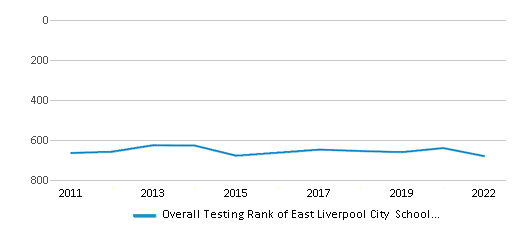
Math Test Scores (% Proficient)
26%
52%
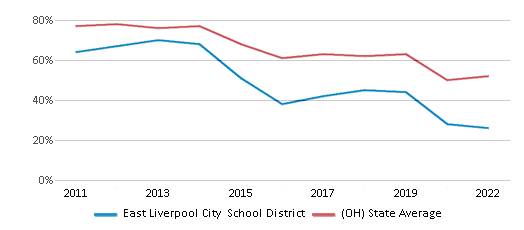
Reading/Language Arts Test Scores (% Proficient)
38%
60%
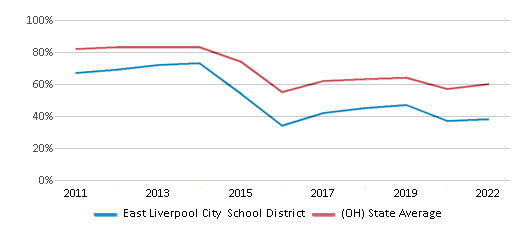
Science Test Scores (% Proficient)
44%
63%
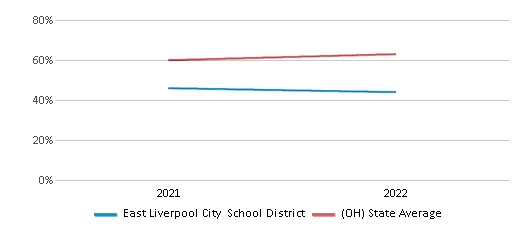
Graduation Rate
80-84%
86%
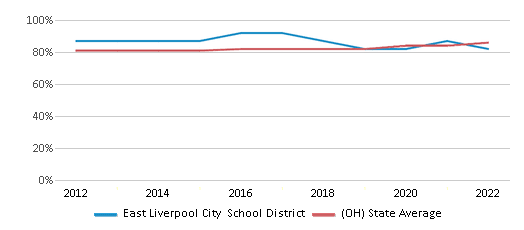
Students by Ethnicity:
Diversity Score
0.32
0.58
# American Indian Students
9 Students
462 Students
% American Indian Students
n/a
n/a
# Asian Students
8 Students
8,061 Students
% Asian Students
n/a
3%
# Hispanic Students
63 Students
30,384 Students
% Hispanic Students
3%
9%
# Black Students
88 Students
67,190 Students
% Black Students
5%
20%
# White Students
1,590 Students
204,949 Students
% White Students
82%
61%
# Hawaiian Students
n/a
329 Students
% Hawaiian Students
n/a
n/a
# Two or more races Students
191 Students
22,737 Students
% of Two or more races Students
10%
7%
Students by Grade:
# Students in PK Grade:
60
45,802
# Students in K Grade:
148
55,948
# Students in 1st Grade:
135
51,388
# Students in 2nd Grade:
142
49,073
# Students in 3rd Grade:
155
40,515
# Students in 4th Grade:
139
38,905
# Students in 5th Grade:
145
30,860
# Students in 6th Grade:
148
12,193
# Students in 7th Grade:
163
4,329
# Students in 8th Grade:
145
4,221
# Students in 9th Grade:
155
368
# Students in 10th Grade:
156
211
# Students in 11th Grade:
151
188
# Students in 12th Grade:
107
111
# Ungraded Students:
-
-
District Revenue and Spending
The revenue/student of $17,548 is higher than the state median of $17,287. The school district revenue/student has grown by 5% over four school years.
The school district's spending/student of $16,986 is less than the state median of $17,235. The school district spending/student has grown by 5% over four school years.
Total Revenue
$34 MM
$28,879 MM
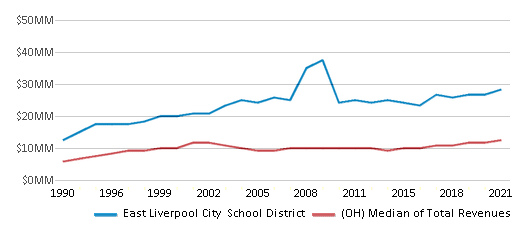
Spending
$33 MM
$28,792 MM
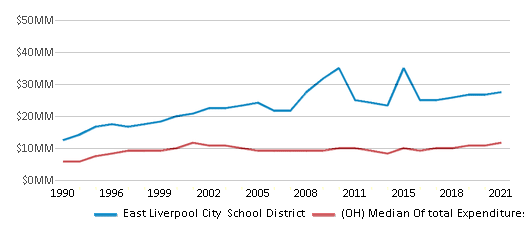
Revenue / Student
$17,548
$17,287
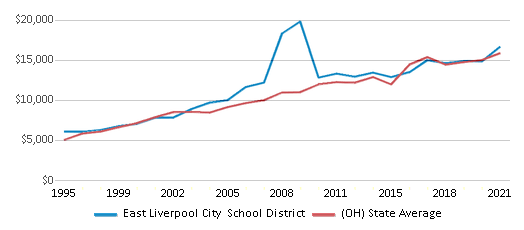
Spending / Student
$16,986
$17,235
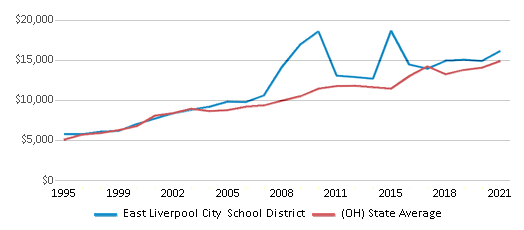
Best East Liverpool City School District Public Preschools (2025)
School
(Math and Reading Proficiency)
(Math and Reading Proficiency)
Location
Grades
Students
Rank: n/an/a
810 W 8th St
East Liverpool, OH 43920
(330) 386-8765
East Liverpool, OH 43920
(330) 386-8765
Grades: PK
| 60 students
Recent Articles

Year-Round Or Traditional Schedule?
Which is more appropriate for your child? A year-round attendance schedule or traditional schedule? We look at the pros and cons.

Why You Should Encourage Your Child to Join a Sports Team
Participating in team sports has a great many benefits for children, there is no doubt. In this article you will learn what those benefits are.

White Students are Now the Minority in U.S. Public Schools
Increasing birth rates among immigrant families from Asia and Central and South America, combined with lower birth rates among white families, means that for the first time in history, public school students in the United States are majority-minority. This shift in demographics poses difficulties for schools as they work to accommodate children of varying language abilities and socio-economic backgrounds.





